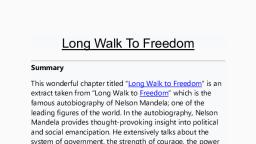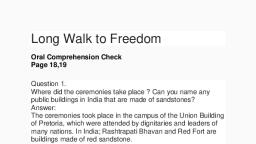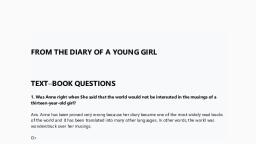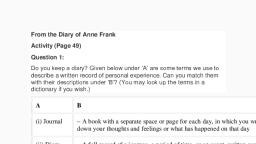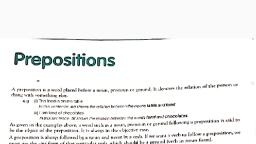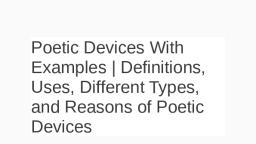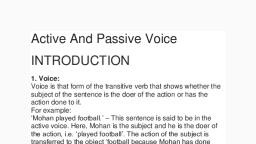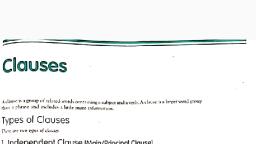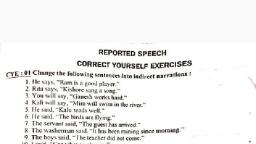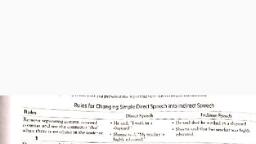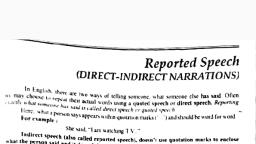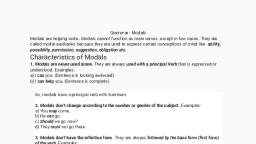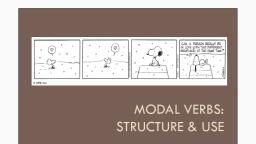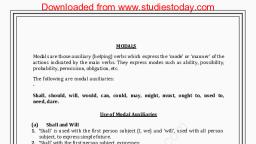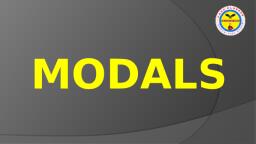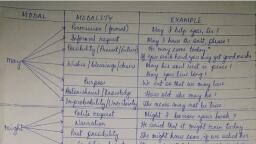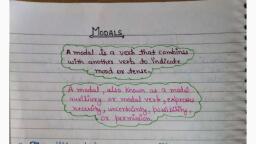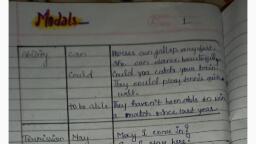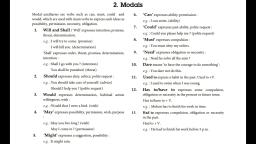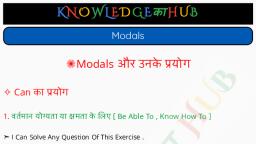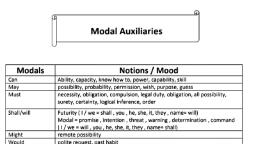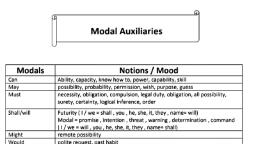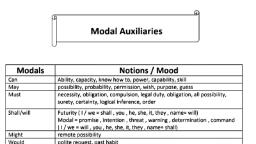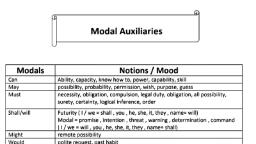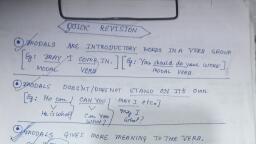Page 1 :
MODAL VERBS, , What are modal verbs?, Modals (also called modal verbs, modal auxiliary verbs, modal auxiliaries), are special verbs that behave irregularly in English. They are different from, normal verbs like “work, play, visit…” They give additional information, about the function of the main verb that follows it. They have a great variety, of communicative functions., , Modals are special verbs. They are a type of auxiliary verb. We use them to, show or indicate the possibility, certainty, permission, ability, and, probability. Modals can take various forms.
Page 2 :
Definition, Uses, Examples and Exercise of Modals, Definition of Modals: Modals are special verbs that are different from normal, verbs. They are never used alone and are always followed by a principal verb., They provide additional information about the principal verb. They are used to, express certainty, possibility, willingness, obligation, necessity and ability., The List of the Modals with their Positive and Negative forms is given below:, , Positive, Negative, 1) Will, Will Not/ Won’t, 2) Would, Would Not/ Wouldn’t, 3) Shall, Shall Not/ Shan’t, 4) Should, Should Not/ Shouldn’t, 5) May, May Not/ Mayn’t, 6) Might, Might Not/ Mightn’t, 7) Can, Can Not/ Can’t, 8) Could, Could Not/ Couldn’t, 9) Must, Must Not/ Mustn’t, 10) Have To, Don't Have To, 11) Need, Need Not/ Needn’t, 12) Ought
Page 3 :
Ought Not To/ Oughtn’t To, 13) Dare, Dare Not/ Daren’t, 14) Used To, Used Not To/ Didn’t Use to, , Uses of Modal ‘Will’, , 1) The first rule for the use of Modal ‘will’ is that it expresses pure future with, second and third person as subjects., 2) The second rule for use of Modal ‘will’ is that it shows willingness, intention,, promise, determination with the first person as a subject., 3) The third and last use of Modal ‘will’ is that it tells about the characteristic,, habit, assumption, invitation or request and insistence., Examples of Modal ‘Will’ are given below:, 1) You will die of a heart attack. (Pure Future), 2) The prime minister will hoist the flag. (Pure Future), 3) I will meet you again. (Promise), 4) I will need your help. (Willingness/ intention), 5) He will achieve his goals. (Determination), 6) A child will usually obey his parents. (Characteristic habit), 7) He will be here at any moment. (Assumption), 8) Will you go with me. (Request), 9) He will not listen to his teacher’s advice. (Insistence), , Uses of Modal ‘Would’, The rule for the use of Modal ‘would’ is that it expresses past habits, polite, request, wish/ preference or an imaginary condition., Examples of Modal ‘Would’ are given below:, 1) He would wake up early in the morning and go to work. (Past habits)
Page 4 :
2) My mother would always make me my favourite dishes. (Past habits), 3) Would you get me a glass of water, please? (Polite request), 4) I would like to see the owner. (Polite request), 5) I wish you would be here. (Wish), 6) I would rather have food at home than outside. (Preference), 7) I would buy a house if I won the lottery. (Preference), , Uses of Modal ‘Shall’, 1) The first rule for the use of Modal ‘Shall’ is that it expresses pure future with, the first person as the subject., 2) The second rule for the use of Modal ‘Shall’ is that it is used to ask for, advice, suggestions, requests, etc. with the first person in the interrogative., 3) The third rule for the use of Modal ‘Shall’ is that it is used to express, command, threat, warning, promise, assurance, determination, etc. with the, second and third person as the subjects., Examples of Modal ‘Shall’ are given below:, 1) We shall go to school tomorrow. (Pure Future), 2) I shall teach you to dance. (Pure Future), 3) Shall I bring a glass of fresh juice for you? (Request), 4) Shall I close the door? (Advice), 5) Shall we go to the market tomorrow? (Suggestion), 6) You shall get a reward for your achievement. (Promise/ Assurance), 7) You shall go to your room. (Command), 8) They shall win the match. (Determination), , Uses of Modal ‘Should’, 1) The first rule for the use of Modal ‘Should’ is that it is used to express duty,, obligation, advisability or desirability., 2) The second rule for the use of Modal ‘Should’ is that it is used to express, logical interference, supposition, assumption, possibility or probability., 3) The third rule for the use of Modal ‘Should’ is that it is used to express a, purpose after ‘lest’., Examples of Modal ‘Should’ are given below:
Page 5 :
1) We should go to school every day. (Duty), 2) You should not be late for work. (Obligation/ Desirability), 3) You should exercise more often. (advisability), 4) He should be at the office by now. (Possibility), 5) If he should see me there, he will be happy. (Probable Condition), 6) Leave on time, lest you should miss the train. (should after lest), , Uses of Modal ‘May’, The rule for the use of Modal, The rule for the use of Modal ‘May’ is that it is used to express possibility,, permission, wish, faith, hope or a purpose., Examples of Modal ‘May’ are given below:, 1) It may snow in the evening. (Possibility), 2) May I go now, sir? (Permission), 3) May God always be with you. (Wish, faith or hope), 4) He is working hard so that he may get an appraisal. (Purpose), , Uses of Modal ‘Might’, The rule for the use of Modal ‘Might’ is that it is used to express less possibility,, permission or a guess., Example of Modal Might are given below:, 1) It might rain today. (Less possibility), 2) Might I go to get the files? (Permission), 3) That might be the new guard. (Guess), , Uses of Modal ‘Can’, The rule for the use of Modal ‘Can’ is that it is used to express permission, possibility,, ability or capacity., Examples of Modal ‘Can’ are given below:, 1) Can I go to the market? (Permission), 2) Anyone can be the thief. (Possibility), 3) He can stay awake for 2 days. (Ability/ Capacity)
Page 6 :
Uses of Modal ‘Could’, The rule for the use of Modal ‘Could’ is that it is used to express ability or capacity in, the past, polite request or a possibility under certain circumstances., Examples of Modal ‘Could’ are given below:, 1) He could run very fast in his youth. (Ability/ Capacity in the past), 2) Could you wait for him? (Polite request), 3) If we had money, we could have bought a house. (Possibility under certain, conditions), , Uses of Modal ‘Must’, The rule for use of Modal ‘Must’ is that it is used to express obligation/ duty,, necessity, compulsion, prohibition, emphatic advice, determination, assumption,, conclusion/ interference, certainty/ strong probability., Examples of Modal ‘Must’ are given below:, 1) The children must obey their parents. (Duty), 2) We must not steal money from anyone. ( Duty), 3) You must follow the orders of your boss. (Obligation), 4) I must reach work on time. (Necessity), 5) He must do as I say. (Compulsion), 6) You must not smoke in public places. (Prohibition), 7) You must see a dentist at once. (Emphatic advice), 8) We must not go before they come back. (Determination), 9) The students must be in their classes at this time. (Strong Probability), 10) He must be 40 years old. (Assumption), 11) He must have left by now. (Certainty), , Uses of Modal ‘Have to’, The rule for the use of Modal ‘Have to’ is that it is used in the sense of must, to give, advice or to recommend something., Examples of Modal ‘Have to’ are given below:, 1) I have to reach there by 9:30 pm. (in the sense of Must), 2) You have to start working soon. (Advice)
Page 7 :
Uses of Modal ‘Need’, The main rule for the use of Modal ‘Need’ is that it chiefly shows the absence of, necessity or compulsion in the negative and interrogative sentences., Examples of the Modal Need are given below:, 1) You need not worry about work., 2) Need I talk to her., , Uses of Modal ‘Ought’, The rule for the use of Modal ‘Will’ is that it is used to express the subjects obligation, or duty and also it is used to give advice., Examples of Modal ‘Ought’ are given below:, 1) I ought to love my parents. (Obligation/ Duty), 2) We ought not to cheat anyone. (Duty), 3) You ought to practise for more than 2 hours a day if you want to clear the exam., , Uses of Modal ‘Dare’, The rule for using the Modal ‘Dare’ is that it is used at places where we need to show, courage. It is generally used in negative and interrogative., Examples of Modal Dare are given below:, 1) I dare not fail in my exams. (Negative), 2) How dare you interrupt us? (Interrogative), , Uses of Modal ‘Used to’, The rule for the usage of Modal ‘Used to’ is that it is used to express past habits and to, express the existence of something in the past., Examples of the Modal ‘Used to’ are given below:, 1) I used to go swimming every morning. (Past Habits), 2) There used to be a door at this place long ago.(Existence of something in the past)
Page 8 :
Modal Exercises, 1., Fill in the blanks with correct modals., 1) He knew that he _______ (Would/ must) be able to reach office in time., 2) You ______ (dare/ could) not enter my house again., 3) I thought he ______ (should/ would) be at school., 4) Raman _____ (can/ should) speak in two voices., 5) I _____ (can’t/ couldn’t) write what you spoke., 6) You _____ (should/ can) have told me earlier., 7) _____ (Can/ Should) i get something to drink, please? I am very thirsty., 8) _______ (Can/ Should) I use your car, please?, 9) You ______ (can/ would) go in now and meet the doctor., 10) I _______ (would/ should) love to teach these children., 11) I ______ (could/ can) eat 5 bananas at a time when i was young., 12) You _____ (must/ will) see the lawyer at once., 13) ______ (May/ Might) god protect you from the pain and agony., 14) My mother ______ (can/ could) watch T.V for hours even now., 15) It _______ (would/ may) be cold in the evening, who knows?, , Answers:, 1) Would, 2) Dare, 3) Would, 4) Can, 5) Couldn’t, 6) Should, 7) Can, 8) Can, 9) Can, 10) Would
Page 9 :
11) Could, 12) Must, 13) May, 14) Can, 15) May, , 2.Complete the letter using the correct word to fill in each blank., Dear Deep,, I was delighted to know that you are building a new house. As a friend, I (a), ………………………. like to offer a word of advice that (b), ………………………. largely solve your water problems in future years. You, (c) ………………………. build in a water harvesting system in your house., This (d) ………………………. be done by digging a percolation tank near, your house. Drains from the roof (e) ………………………. carry the, rainwater to the tank. This (f) ………………………. help to recharge, groundwater., Yours sincerely,, Sneha, , Answer:, (a) would, (b) will, (c) must, (d) can, (e) will, (f) will, , 3.Fill in the blanks using suitable modals., 1. He ………………………. (not) go out as it is raining., 2. The meeting will start just now. They ………………………. be, present., 3. They ………………………. start early as it was getting dark., 4. You ………………………. not pluck flowers from the garden., 5. She ………………………. stay up late. She is unwell.
Page 10 :
6. We ………………………. to spend our money carefully., 7. ……………………… you go there?, 8. Come what may, I ………………………. finish it by today., 9. They ………………………. abuse the beggars., 10.We ………………………. look after our aged parents., , Answer:, 1. must not, 2. have to, 3. had to, 4. must, 5. mustn’t, 6. ought, 7. Need, 8. have to, 9. should not, 10.should, , 4.Fill in the blanks in the following sentences with modals – Will / Shall , Would/, Should or Can/Could., 1. She told me that she was unwell so she………..not go to office., 2. The visitors ………..not carry eatables with them in the hotel., 3. As he is in dire need of money, we……………help him immediately., 4. ……………..you please lend me your book for a week?, 5. His son is not so brilliant in his studies but he………….pass the examination., 6. I ………be thankful to you if you help me at this time of need., 7. Drive fast lest you……………miss the flight., 8. ……………you like to accompany us to the market tomorrow?, 9. The lady has grown so old that she ……..not walk without a stick., 10. Had he worked hard, he ………..have passed the examination., Answers, 1.would 2.can 3.should, 6.shall, , 7.should 8.would, , 4.could 5.will, 9.can 10. Would
Page 11 :
5.Fill in the blanks in the following sentences with modals – Will / Shall , Would/ Should, or Can/Could, May/Might, used to, Must/ought to etc., 1. She endeavoured her best to surpass the target but she……………..not., 2. You……………….to have fulfilled your promise under all the circumstances., 3. I assure you that I shall help you in this matter if I ………….., 4. He ………..have succeeded in his business if he had conducted it sincerely., 5. The teacher advised him to work hard lest he ………fail in the examination., 6. They feared that the thieves……….. have fled out of the city., 7. His mentor helped him in his research work so that he………….complete it in time., 8. Children……………respect their elders and get their blessings., 9. The clever king…………..to wander in the city in the garb of a beggar at night., 10. Had the manager told the whole truth to the boss, he……….. not have punished him., Answers, , 1.could 2.should 3.can, would, , 4.would 5.should 6.might, , 7.could 8. must, , 9.used, , 6.Fill in the blanks in the following sentences with a correct one out of given options, having appropriate use of a modal in it (Modals– Will / Shall , Would/ Should or, Can/Could, May/Might, used to, Must/ought to etc.), , 1. If he had paid his attention towards his business……………., a. he should not be ruined like this., b. he were not be ruined like this., c. he would not have ruined like this., d. he could not have ruined like this., , 2, We people eat so that…………………., a. we can live., , 10.
Page 12 :
b. we may live., c. we should live., d. we shall live., , 3. If the patient had not been provided with medical aid in time……………….., a. he would not have survived., b. he could not have survived., c. he may not have survived., d. he will not have survived., , 4. During my stay in this city last year………………………, a. I had visited my native village every month., b. I used to visit my native village every month., c. I might visit my native village every month., d. I would visit my native village every month., , 5. The parents toiled hard during their whole life so that their……………., a. children might prosper in their life., b. children can prosper in their life., c. children will prosper in their life., d. children would prosper in their life.
Page 13 :
6. You should take care of your health lest………….., a. you may fall ill, b. you may fall ill, c. you could fall ill., d. you should fall ill., , 7. Those employees who have finished their work…………, a. will leave the office now., b. may leave the office now., c. could leave the office now., d. might leave the office now., , 8. if I were rich………….., a. I shall help the poor., b. I could help the poor., c. I would help the poor., d. I may help the poor., , 9. His brother told me that he………………, a. would be joining a new job next month., b. he will be joining a new job next month., c. he shall be joining a new job next month.
Page 14 :
d. he must be joining a new job next month., , 10. You are advised not to eat raw fruit…………….., a. which will spoil your health., b. which could spoil your health., c. which can spoil your health., d. which should spoil your health., Answers, , (Answers : 1. c 2.b 3. a 4.b 5.a 6.d 7.b 8.c 9.a 10. c), , 7.Fill in the blanks in the following sentences with a correct one out of given options, having appropriate use of a modal in it (Modals– Will / Shall , Would/ Should or, Can/Could, May/Might, used to, Must/ought to etc.), , 1. The speaker said to the audience present there,”……………….., a. “would you please pay your attention to me?”, b. “will you please pay your attention to me?”, c.” shall you please pay your attention to me?”, d.” may you please pay your attention to me?”, , 2. I am sure that …………………………………….as you sing very well., a. your voice would be very melodious., b. your voice will be very melodious.
Page 15 :
c. your voice must be very melodious., d. your voice should be very melodious., , 3. ………………………………… to prevent any accident on the road., a. We must observe rules of the road while driving, b. We can observe rules of the road while driving, c. We ought observe rules of the road while driving, d. We shall observe rules of the road while driving, , 4. Though he tried hard and studied with full, concentration …………………………………., a. yet he would not succeed in his examination., b. yet he could not succeed in his examination., c. yet he might not succeed in his examination., d. yet he may not succeed in his examination., , 5. The world is a very nice place but…………………….., a. we must know how to live on this earth., b. we may know how to live on this earth., c. we can know how to live on this earth., d. we would know how to live on this earth.
Page 16 :
Answers, , (Answer : 1.b 2.c 3.a 4.b 5.a ), , 8.Fill in the blanks in the following sentences with appropriate modals., (Modals– Will / Shall , Would/ Should or Can/Could, May/Might), , Milk is a nutritious food enriched with vitamins and proteins. We 1.……………..take milk, regularly so that we 2.………not develop deficiencies of undernourishment in our body., The aged persons, children and patients 3. ………………take milk in sufficient quantity, as it provides strength to their body. We 4.……………. supplement it with other elements, of food like fruit, vegetables and pulses for proper growth of the body. But, we 5.……………consume milk of good quality only otherwise it 6……………cause harm, to the body. We 7.…………..be very careful while selecting items of our food because, there are chances that these 8.………………. be adulterated., , Answers, , (Answers: 1.should 2. may 3. must 4. can 5.must 6. might 7.must 8. might ), , 9.Fill in the blanks in the following sentences with appropriate modals., (Modals– Will / Shall , Would/ Should or Can/Could, May/Might), , Man 1…………………live without food and water for some time, but, he 2.……………..not live without air. We 3………………..inhale pure, oxygen-rich air., Breathing foul or polluted air 4.……………….cause chest-related problems. Exposure to, cold air 5.……………..be avoided. When a person catches cold, he 6………………take, simple, light and easily digestible food. He 7 …………………. avoid going out in cold, under all circumstances. He 8.…………… to keep his body warm by putting on, woollen clothes., Answers, , Answers: 1.can 2. can 3. should, , 4. can, , 5. must, , 6. must, , 7.must 8. ought
